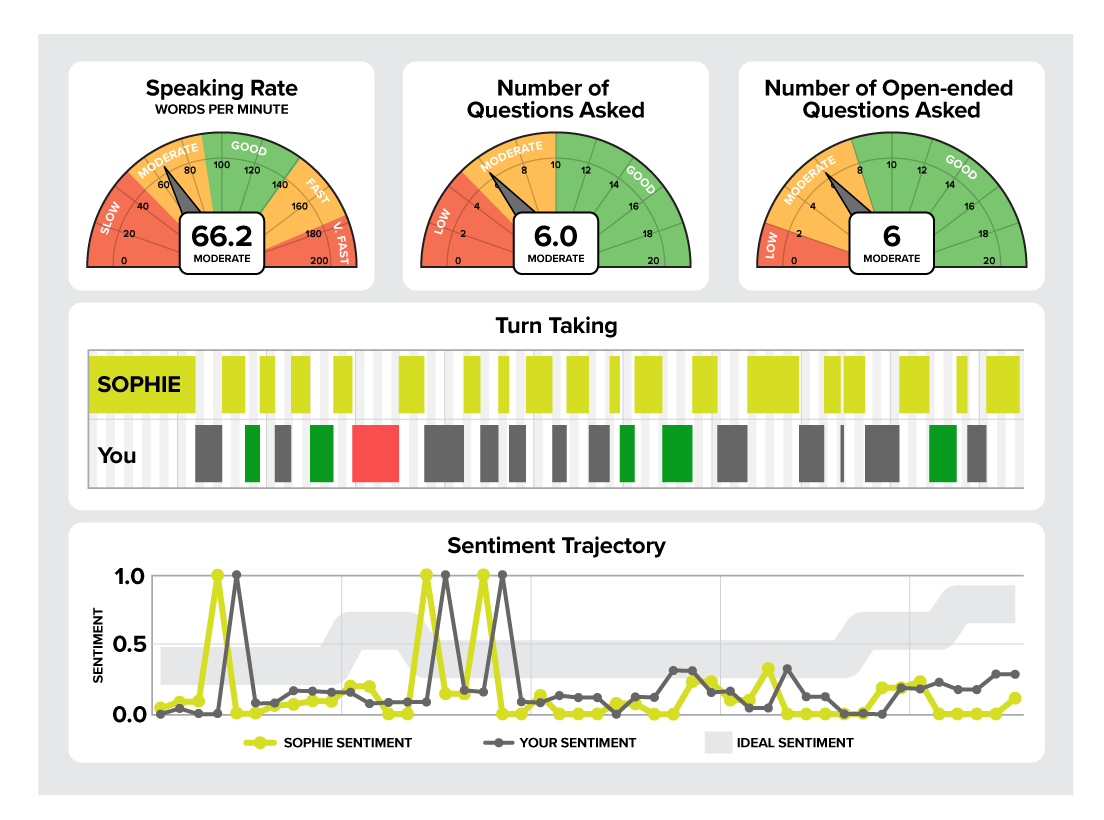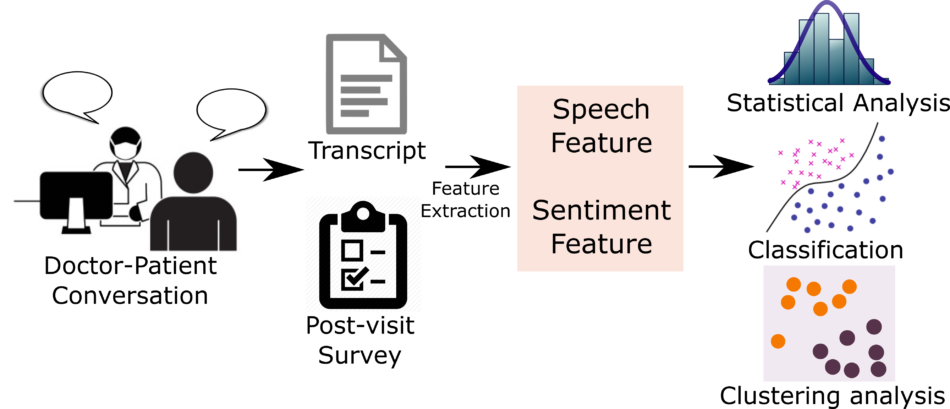SOPHIE: Standardized Online Patient for Healthcare Interaction Education
Have you ever not understood your doctor but were either too shy, too confused, or just didn’t know what to ask to get better clarification?
Advanced cancer patients sometimes spend their final days in unnecessary distress while receiving aggressive cancer treatment that is unlikely to work. Part of this problem stems from patients having an incorrect understanding of their prognosis. Although studies have identified that effective doctor-patient communication is associated with better patient outcomes, most cancer patients misunderstand their prognosis.
One major problem is: What are the characteristics of an interaction which makes good doctor-patient communication? In our ongoing work, we analyzed 386 conversations of late-stage cancer patients with their doctors.
- Using unsupervised clustering, we identify common styles of communication and determine which styles are more successful than others along with some gender differences.
- We developed methods for the automatic detection of two behavioral paradigms, lecturing, and positive language usage patterns (sentiment trajectory of conversation).
- We show that the degree of lecturing structure is significantly associated with the level of prognosis misunderstanding.
- A certain sentiment trajectory style (one which involves delivering technical information and ending with positive language) is associated with better prognosis understanding.
We then instantiated these findings into a working system–SOPHIE (Standardized Online Patient for Healthcare Interaction Education) using an iterative participatory process, and validated the efficacy of it through a qualitative study with 9 practicing physicians.
Sample feedback:

Sample Dialogue:
Importance of 3Es (empathy, explicit and empower)
References:
K. Haut, C. Wohn, B. Kane, T. Carroll, C. Guigno, V. Kumar, R. Epstein, L. Schubert, E. Hoque. Validating a virtual human and automated feedback system for training doctor-patient communication skills. Affective Computing and Intelligent Interaction (ACII), September 2023, Boston, MA.
Kane B.; Giugno C.; Schubert L.; Haut K.; Wohn C.; Hoque E. Managing Emotional Dialogue for a Virtual Cancer Patient: A Schema-Guided Approach. IEEE Transactions on Affective Computing, 2024
M. R. Ali, T. K. Sen, B. Kane, S. Bose, T. Carroll, R. Epstein, L. Schubert, E. Hoque, Novel Computational Linguistic Measures, Dialogue System and the Development of SOPHIE: Standardized Online Patient for Healthcare Interaction Education, IEEE Transactions on Affective Computing, 2021
Phyllis Butow, E. Hoque, Using Artificial Intelligence to Analyze and Teach Communication in Healthcare, The Breast, Vol. 50, pp. 49-55, April 2020
M. R. Ali, T. K. Sen, V-D. Nguyen, R. Rawassizadeh, P. Duberstein, R. Epstein, E. Hoque, What Computers Can Teach Us About Doctor-Patient Communication: Leveraging Gender Differences in Cancer Care, 8th International Conference on Affective Computing and Intelligent Interaction (ACII 2019), Cambridge, UK, September 2019
T. Sen, M. R. Ali, R. Epstein, P. Duberstein, E. Hoque, “Modeling Doctor-Patient Communication with Affective Text Analysis” Affective Computing and Intelligent Interaction (ACII 2017), San Antonio, USA September 2017
Press
[1] https://www.rochester.edu/newscenter/virtual-patient-sophie-prepares-doctors-for-end-of-life-conversations-485392/
[2] https://www.healio.com/news/hematology-oncology/20220215/ai-platform-enables-oncologists-to-practice-conversations-with-terminally-ill-patients
Code
The code is available at:
https://github.com/mali7/voice

